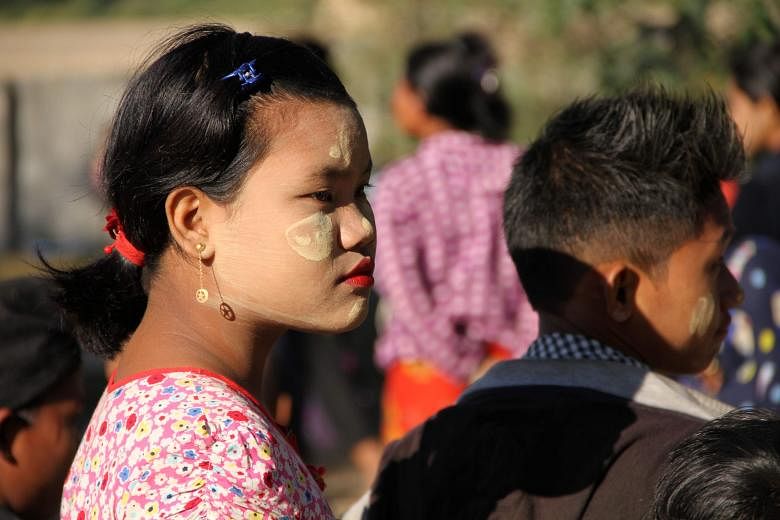YANGON • For many marginalised ethnic minority groups in conflict-plagued regions of Myanmar, next month's national elections had at least offered a glimmer of hope for empowerment.
But a decision to exclude swathes of their homeland from the vote - ostensibly over security concerns - has instead filled them with anger and despair, with nearly two million people now disenfranchised.
Ms Aung San Suu Kyi's ruling National League for Democracy (NLD) is widely expected to be returned to power in the Nov 8 polls - only the second since the country emerged from outright military rule. But the party faces waning support in many ethnic minority areas, where discontent has now intensified.
Two weeks ago, the election commission announced a long list of constituencies where voting will not take place, leaving disenfranchised more than a million in Rakhine and hundreds of thousands more elsewhere.
"This is devastating," said Mr Hla Maung Oo, an ethnic Rakhine and head of one of many camps for displaced people in his state. "I'm depressed by the decision, because I knew whom I was going to vote for from the beginning."
Tensions in Rakhine were high even before the move. A civil war between the Myanmar military and the Arakan Army (AA) - a militant group fighting for more autonomy for the ethnic Rakhine - has killed and wounded hundreds and forced 200,000 from their homes.
Both sides stand accused of abuses, but the AA still enjoys widespread support from a people who have long felt marginalised by the majority Bamar in one of the nation's poorest states.
One community in Rakhine state was notably unaffected by this latest decision, but only because they were already disenfranchised.
Myanmar's Rohingya Muslims have had their citizenship and rights stripped away over decades.
A brutal military crackdown in 2017 forced 750,000 to flee to refugee camps in Bangladesh - violence that now sees Myanmar facing genocide charges at the United Nations' top court.
But 600,000 more Rohingya still live in Myanmar, mostly in Rakhine state, living under what rights groups have described as a system of apartheid.
"We had no hope before, and we still have no hope," Mr Saw Aung, a Rohingya from Minbya township, told Agence France-Presse by phone.
"Even if the elections were held, our situation would not improve."
In total, nearly two million people of voting age - about 5 per cent of the electorate - will now be unable to cast a ballot.
People in other states across the country - notably in Shan, Kachin and Karen - have also been left reeling by the announcement.
Kachin State People's Party MP Dwe Bu accused the government of letting down ethnic minorities.
"We believed the NLD government would strive for democracy and work for the public," she said.
"But now, I feel they're even worse."
The NLD denied claims that it had interfered, while the election commission last week tried to deflect the blame, stating all voting cancellations had been decided in consultation with the government, including two military-controlled ministries.
Regardless of who made the decision, Mr Htoi Aung - forced from his home by fighting between the military and Kachin rebels - will be among the many unable to vote next month.
"Our people have lost their rights and our ethnic party will no longer be able to win."
AGENCE FRANCE-PRESSE

